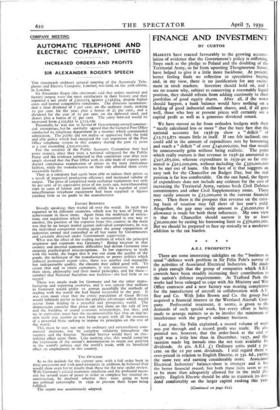FINANCE AND INVESTMEN1
BY CUSTOS
MARKEL'S have reacted favourably to the growing accumu- lation of evidence that the Government's policy is stiffening. Steps such as the pledge to Poland and the doubling of the Territorial Army, so far from upsetting Throgmorton Street, have helped to give it a little more backbone. At present, better feeling finds no reflection in speculative' buying and, in my view, there is no justification for any excite- ment in stock markets. Investors should hold on, and I see no reason why, subject to conserving a reasonably liquid position, they should refrain from adding cautiously to their portfolios of good equity shares. After all, if the worst should happen, a bank balance would have nothing on a holding of good industrial ordinary shares, and, if all goes well, those who buy at present prices will certainly see a capital profit as well as a generous dividend return.
We have moved so far from orthodox budgets with their " nicely calculated less or more " that the bare fact that the national accounts for 1938-39 show a " deficit " of £12,713,871 means little in itself. If one felt inclined, one could add in the amount of expenditure ,met by borrowing and reach a " deficit " of over £140,000,000, but that would be unnecessarily grim without being realistic. The point which really matters is that revenue in 1938-39 amounted to £927,285,000, whereas expenditure in 1939-40 so far esti- mated is £915,000,000, without including the £350,000,000 to be met out of loans. On the face of it that suggests an easy task for the Chancellor on Budget Day, but the real position is far less comfortable. On the one hand, the figure of expenditure does not include any estimate for the cost of increasing the Territorial Army, various fresh Civil Defence commitments and other Civil Supplementary items. These may easily amount to £25,000,000 in the current financial year. Then there is the prospect that revenue on the exist- ing basis of taxation may fall short of last year's yield. Altogether, the gap may easily amount to £30,000,000 if allowance is made for both these influences. My own view is that the Chancellor should narrow it by at least £20,000,000 by raising his borrowing limit to L370,000,000. But we should be prepared to face up stoically to a moderate addition to the tax burden.










































 Previous page
Previous page